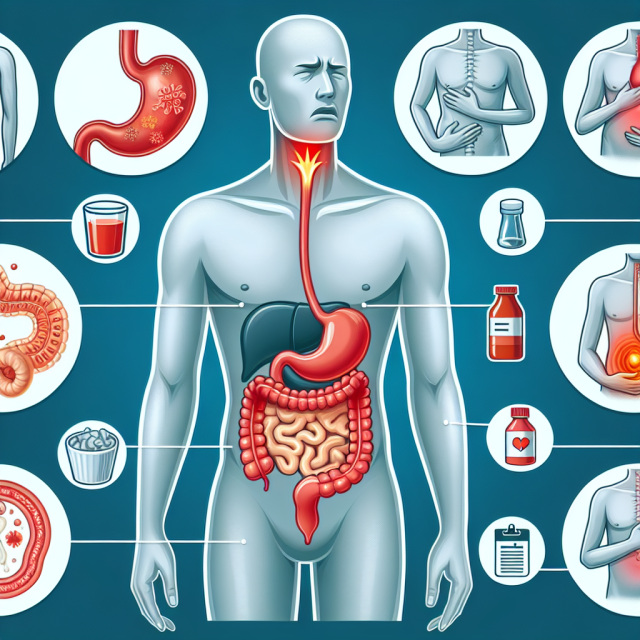
Acid reflux, a common digestive disorder, affects millions of people worldwide. Characterized by the backward flow of stomach acid into the esophagus, it can lead to a range of uncomfortable symptoms. Understanding these symptoms is essential for effective management and relief. This article delves into the common symptoms of acid reflux, providing you with the information you need to recognize and address this condition.
Understanding Acid Reflux and Its Symptoms
Acid reflux occurs when the lower esophageal sphincter (LES) fails to close properly, allowing stomach acid to escape into the esophagus. This condition, also known as gastroesophageal reflux disease (GERD) when it becomes chronic, can lead to various symptoms that disrupt daily life. It is essential to understand these symptoms to identify the condition early and seek appropriate treatment.
The symptoms of acid reflux can vary in severity and frequency. While some individuals may experience mild discomfort occasionally, others might suffer from severe symptoms that occur frequently. Common symptoms include heartburn, regurgitation, chest pain, difficulty swallowing, chronic cough, and hoarseness. Recognizing these symptoms can help individuals take proactive steps to manage their condition effectively.
Recognizing Heartburn: A Key Symptom
Heartburn is one of the most recognizable symptoms of acid reflux. It is characterized by a burning sensation in the chest, often extending to the throat. This sensation usually occurs after eating and may be aggravated by lying down or bending over. Heartburn is not only uncomfortable but can also be a sign of underlying acid reflux that needs attention.
Frequent heartburn can significantly impact one’s quality of life, causing discomfort and disrupting daily activities. While over-the-counter medications can provide temporary relief, persistent heartburn should be evaluated by a healthcare professional. It’s important to note that while heartburn is a common symptom of acid reflux, not everyone with acid reflux experiences heartburn, making it crucial to be aware of other potential symptoms.
Regurgitation: When Stomach Acid Returns
Regurgitation is another common symptom of acid reflux, where stomach acid or food flows back into the mouth or throat. This can lead to a sour or bitter taste, often accompanied by a sensation of liquid or food coming back up. Regurgitation can occur at any time but is more likely when lying down or after a heavy meal.
This symptom can be particularly bothersome and embarrassing, impacting social interactions and daily activities. In some cases, regurgitation can lead to more serious complications, such as aspiration, where stomach contents are inhaled into the lungs. Understanding and addressing regurgitation is crucial for managing acid reflux effectively and preventing further complications.
Chest Pain: More Than Just Discomfort
Chest pain associated with acid reflux can often be mistaken for heart-related issues. This pain is typically a result of stomach acid irritating the lining of the esophagus, leading to a burning sensation in the chest. It is important to differentiate this pain from cardiac-related chest pain, as the management strategies differ significantly.
While acid reflux-induced chest pain can be alarming, it is usually not life-threatening. However, persistent chest pain should never be ignored, and medical evaluation is essential to rule out any serious conditions. Understanding the nature of chest pain related to acid reflux can help individuals seek appropriate treatment and find relief from this uncomfortable symptom.
Difficulty Swallowing: A Concerning Sign
Difficulty swallowing, known as dysphagia, can be a concerning symptom of acid reflux. This occurs when stomach acid causes inflammation or narrowing of the esophagus, making it challenging to swallow food or liquids. Individuals may feel as though food is stuck in their throat or chest, leading to discomfort and anxiety during meals.
Dysphagia can significantly impact nutritional intake and overall well-being. If left untreated, it can lead to weight loss and malnutrition. Recognizing difficulty swallowing as a symptom of acid reflux is crucial for timely intervention and management. Consulting a healthcare professional can help determine the underlying cause and appropriate treatment options.
Chronic Cough and Hoarseness Explained
Chronic cough and hoarseness are less commonly recognized symptoms of acid reflux but can be equally disruptive. Acid reflux can irritate the throat and vocal cords, leading to a persistent cough or changes in voice quality. These symptoms are often mistaken for respiratory issues, delaying appropriate treatment for acid reflux.
Understanding the link between acid reflux and respiratory symptoms is essential for effective management. Addressing the underlying acid reflux can often alleviate the cough and hoarseness, improving quality of life. If you experience a chronic cough or hoarseness without an apparent cause, consider evaluating for acid reflux as a potential underlying factor.
Recognizing the symptoms of acid reflux is the first step toward effective management and relief. From heartburn and regurgitation to chest pain and difficulty swallowing, understanding these symptoms can help individuals seek timely medical advice and appropriate treatment. If you suspect you have acid reflux, consult with a healthcare professional to explore your symptoms and develop a comprehensive management plan. By addressing these symptoms early, you can improve your quality of life and prevent potential complications associated with chronic acid reflux.





